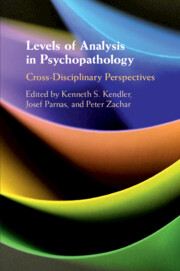Book contents
- Levels of Analysis in Psychopathology
- Advance Praise for Levels of Analysis in Psychopathology
- Levels of Analysis in Psychopathology
- Copyright page
- Contents
- Figures
- Tables
- Contributors
- Preface
- General Introduction
- Part I Neuroscience, Mechanisms, and RDoC
- Part II Phenomenology, Biological Psychology, and the Mind–Body Problem
- Part III Taxonomy, Integration, and Multiple Levels of Explanation
- Section 8
- Section 9
- 25 Introduction
- 26 Should Psychiatry Be Precise? Reduction, Big Data, and Nosological Revision in Mental Health Research
- 27 Commentary on “Should Psychiatry Be Precise? Reduction, Big Data, and Nosological Revision in Mental Health Research”
- Section 10
- Section 11
- Section 12
- Section 13
- Section 14
- Section 15
- Index
- References
27 - Commentary on “Should Psychiatry Be Precise? Reduction, Big Data, and Nosological Revision in Mental Health Research”
from Section 9
Published online by Cambridge University Press: 02 April 2020
- Levels of Analysis in Psychopathology
- Advance Praise for Levels of Analysis in Psychopathology
- Levels of Analysis in Psychopathology
- Copyright page
- Contents
- Figures
- Tables
- Contributors
- Preface
- General Introduction
- Part I Neuroscience, Mechanisms, and RDoC
- Part II Phenomenology, Biological Psychology, and the Mind–Body Problem
- Part III Taxonomy, Integration, and Multiple Levels of Explanation
- Section 8
- Section 9
- 25 Introduction
- 26 Should Psychiatry Be Precise? Reduction, Big Data, and Nosological Revision in Mental Health Research
- 27 Commentary on “Should Psychiatry Be Precise? Reduction, Big Data, and Nosological Revision in Mental Health Research”
- Section 10
- Section 11
- Section 12
- Section 13
- Section 14
- Section 15
- Index
- References
Summary
The chapter “Should Psychiatry Be Precise?” challenges the Precision Medicine Initiative (PMI) and the Research Domains Criteria (RDoC) initiative that have been advanced by the National Institute of Health. The chapter includes valuable points about the challenges of applying reduction across levels of analysis, the value of nosological revision, and the potential pitfalls of using big data. But the overall argument constructed in the chapter is a straw man that does not reflect well the intentions of those who designed these initiatives nor the understanding and aims of scientists now engaged in research under the aegis of these initiatives. A more constructive approach might focus on specification of tractable questions about causality in mental health research, and aspects of subjective experience that are currently under-represented in biological psychiatry.
Keywords
- Type
- Chapter
- Information
- Levels of Analysis in PsychopathologyCross-Disciplinary Perspectives, pp. 335 - 342Publisher: Cambridge University PressPrint publication year: 2020



